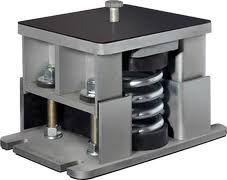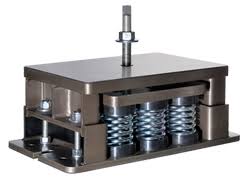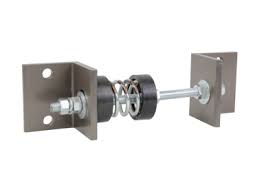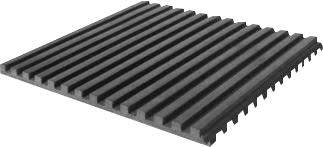Discover the Benefits of Neoprene Vibration Isolators for Machinery
Neoprene vibration isolators are an essential component in the machinery industry, designed to effectively reduce the transmission of vibration, noise, and shock from machinery to the surrounding environment. These isolators provide numerous benefits for both the machinery and the surrounding area, making them a valuable investment for any industrial operation. In this article, we will explore the various benefits of neoprene vibration isolators and demonstrate why they are a crucial consideration for machinery applications.
Neoprene vibration isolators are specifically designed to reduce the transmission of vibration from machinery to its surrounding environment. They are commonly used in industrial settings to protect nearby structures, equipment, and personnel from the potentially damaging effects of excessive vibration. Neoprene is an ideal material for vibration isolation due to its ability to effectively absorb and dissipate vibration energy. This helps to ensure that machinery operates smoothly and efficiently, while also minimizing the impact of noise and vibration on the surrounding area. Additionally, neoprene vibration isolators are durable, resistant to oils and chemicals, and have a high load-bearing capacity, making them suitable for a wide range of applications.
Neoprene vibration isolators provide an effective solution for reducing the transfer of vibration from machinery to its surroundings, thus protecting nearby structures, equipment, and personnel. The material's ability to absorb and dissipate vibration energy minimizes the impact of noise and vibration on the surrounding area. Neoprene isolators are also durable, resistant to oils and chemicals, and have a high load-bearing capacity, making them suitable for various industrial applications.
Understanding the Role of Neoprene Vibration Isolators in Industrial Machinery
vibration isolation types

Neoprene vibration isolators are used in industrial machinery to absorb and minimize the effects of vibrations caused by the operation of the equipment. These isolators are designed to provide a cushioning effect, reducing the transmission of vibrations to the surrounding environment and other components of the machinery. Neoprene, a synthetic rubber material, is commonly chosen for its resilience, flexibility, and resistance to oils and chemicals. It is capable of effectively isolating and dampening vibrations, thereby improving the performance and longevity of industrial machinery. These isolators are commonly used in heavy-duty applications such as compressors, pumps, engines, and other rotating equipment. By understanding the role of neoprene vibration isolators, engineers and operators can optimize the performance and reliability of industrial machinery.
The Advantages of Using Neoprene Vibration Isolators in HVAC Systems

Neoprene vibration isolators offer several advantages in HVAC systems. These include the ability to effectively reduce vibration and noise, prolong equipment lifespan, and improve overall system performance. Neoprene is also resistant to oils and chemicals, making it a durable and reliable material for HVAC applications. Additionally, neoprene isolators are cost-effective and easy to install, making them a popular choice for HVAC professionals. Overall, using neoprene vibration isolators can lead to a more efficient and quieter HVAC system, ultimately benefiting building occupants and maintenance personnel.
How Neoprene Vibration Isolators Improve the Performance of Heavy Equipment
vibration isolator selection guide

Neoprene vibration isolators improve the performance of heavy equipment by effectively reducing the transmission of vibrations and shock. They are designed to absorb and dissipate the energy generated by the equipment, thus minimizing the impact on surrounding structures and machinery. This helps to prevent damage and wear on the equipment, as well as reduce noise levels. Neoprene isolators also help to increase the overall efficiency and lifespan of heavy equipment by providing a stable and secure base for operation.
The Importance of Neoprene Vibration Isolators in Reducing Noise in Structures

Neoprene vibration isolators are essential in reducing noise in structures by minimizing the transfer of vibrations from one part of the structure to another. These isolators effectively absorb and dissipate vibrations, preventing them from propagating through the building and causing noise. In addition to reducing noise transmission, neoprene vibration isolators also help to protect the structural integrity of the building by preventing excessive movement and vibration. This is particularly important in areas where heavy machinery or equipment is being used, as vibrations can lead to structural damage over time. Neoprene is an ideal material for vibration isolators due to its excellent resilience, durability, and ability to withstand heavy loads. It also has the added benefit of being resistant to oils, chemicals, and extreme temperatures, making it suitable for a wide range of applications. Overall, the use of neoprene vibration isolators is crucial in creating a more comfortable and efficient environment within structures while also ensuring the longevity of the building itself.
Selecting the Right Neoprene Vibration Isolators for Specific Applications
When selecting the right neoprene vibration isolators for specific applications, it's important to consider factors such as the level of vibration and shock the isolators will need to absorb, the weight of the equipment being isolated, and the environment in which the isolators will be used. Neoprene isolators are known for their durability and resistance to oil, making them suitable for a wide range of applications including industrial machinery, HVAC equipment, and marine installations. It's also important to consider the type of neoprene material, as different formulations offer varying levels of stiffness and damping characteristics. Additionally, the design and configuration of the isolators should be chosen to effectively isolate vibration and provide stability for the equipment. Consulting with a vibration isolation specialist can help in selecting the right neoprene isolators for specific applications.
Maximizing Efficiency with Neoprene Vibration Isolators in Marine Equipment
Neoprene vibration isolators are commonly used in marine equipment to maximize efficiency and minimize the impact of vibrations on the performance of the machinery. These isolators are made of a durable and flexible material that effectively absorbs shocks and vibrations, protecting the equipment from damage and reducing noise levels. By installing neoprene vibration isolators in marine equipment, operators can improve overall efficiency, extend the lifespan of the machinery, and create a more comfortable working environment for crew members. This technology is particularly beneficial for marine vessels that operate in challenging conditions, such as heavy waves or rough seas, where vibrations can have a significant impact on equipment performance.
The Environmental Benefits of Using Neoprene Vibration Isolators in Construction
Neoprene vibration isolators provide environmental benefits in construction by reducing the transmission of mechanical vibrations and noise pollution. This helps to minimize the impact on surrounding ecosystems and wildlife. Additionally, neoprene is a durable and long-lasting material, reducing the need for frequent replacements and the associated waste. The use of neoprene isolators also contributes to energy efficiency by improving the performance of mechanical systems, leading to potential energy savings. Overall, incorporating neoprene vibration isolators in construction projects can help reduce the environmental footprint and promote sustainable building practices.
Comparing Neoprene Vibration Isolators with Other Types of Isolation Materials
Neoprene vibration isolators have several advantages compared to other types of isolation materials. For example, neoprene is known for its durability and resistance to both oil and ozone, making it a reliable choice for long-term use. Neoprene isolators also have the ability to withstand a wide range of temperatures, making them suitable for various environmental conditions. In addition, neoprene isolators are known for their flexibility and ability to absorb and dissipate vibrations effectively. This makes them a preferred choice for applications where vibration control is crucial, such as in machinery, equipment, and HVAC systems. Compared to other isolation materials such as rubber or silicone, neoprene offers a good balance of flexibility, durability, and vibration dampening properties, making it a versatile option for a range of isolation needs.
In conclusion, neoprene vibration isolators offer a range of benefits for machinery, including reducing noise, increasing equipment lifespan, and minimizing maintenance costs. By effectively dampening vibrations, neoprene isolators provide a reliable solution for improving machine performance and worker safety. With their durable and weather-resistant properties, neoprene vibration isolators are a valuable investment for any industrial or mechanical application.
See also
https://www.kistler.com/us/en/products/accessories/vibration-isolation/ https://www.vibrachoc.com/en/products/vibration-isolators https://www.sunnexmounts.com/vibration-isolators/
تعليقات
إرسال تعليق